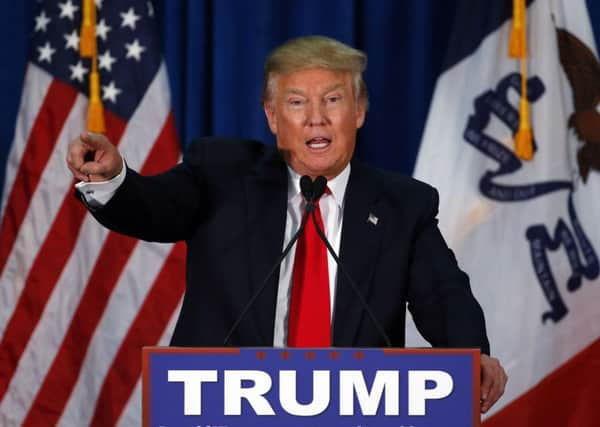Ted Bromund: The very unlikely political parallels between Donald Trump and Jeremy Corbyn


Obviously, both of them are in a sense outsiders. But they’re more interesting for what they say about the American and British political systems. Our systems are fundamentally different, and yet at times, those differences seem to shrink. This is such a time.
Start with how contenders win the highest office. Since 1972, the US primary process has been open: there are no more old-school political bosses. There is no way for the Democrats or the Republicans to prevent someone from seeking their nomination and, potentially, winning it.
Advertisement
Hide AdAdvertisement
Hide AdTrump’s not the first insurgent candidate to benefit from that system, and he won’t be the last.
The most famous beneficiary of all, of course, is sitting in the White House right now. But then, Corbyn’s only leading the Labour Party because he won what was effectively a primary contest.
In the good old days, it was impossible to lead a British party unless you had the nominal support of a majority of your Parliamentary colleagues. The so-called reforms of Tony Blair and Ed Miliband threw that away: now all you need is a few foolish MPs to back you and you’re away into what looks a lot like an American primary system. And you might just win.
In this sense, British politics are becoming more American. But there are limits: as witnessed by Corbyn’s reshuffle, it’s hard to lead your party if no one’s got your back in the Commons. The US system is still basically more likely to produce a Trump than the British one is a Corbyn.
Advertisement
Hide AdAdvertisement
Hide AdBut when they do arrive on the scene, the attitude of their supporters is strikingly similar. When surveyed, Corbyn’s supporters consistently say that they don’t care if their man leads Labour to a massive defeat in 2020. They’d rather lose with Marx than win with Blair.
Trump’s supporters agree: surveys suggest they don’t care if their man is destined to lose to the Democratic nominee. Of course, that might not be his destiny. You hold elections because you don’t know the outcome.
But the point is they don’t care. True, it’s early days in both Britain and the US: it’s all very well saying you don’t care if you lose if you secretly believe you’re going to win. I’m yet to be persuaded that Corbyn’s support will be there in 2019 if Labour looks like it will be decimated.
Yet Labour stuck with Michael Foot in 1983, and the Republicans did the same with a far greater man, Barry Goldwater, in 1964. Neither looked like winning, but neither party cared. So it’s far from impossible that lots of Corbyn and Trump supporters really mean what they say.
Advertisement
Hide AdAdvertisement
Hide AdTrump has rapidly become a hate figure on the British left, so I doubt Corbyn’s supporters would recognise their man as the Trump of British politics. But in yet another way, they’re closer than they seem. As a New York Times survey earlier this month pointed out, a lot of Trump’s supporters are former Democrats. To see why, we have to go back to Ronald Reagan.
One of Reagan’s achievements was to shift a block of white, ethnic, low-middle class voters from the Democrats to the Republicans. A few years ago, historian Walter Russell Mead described this block of voters as Jacksonians. And President Andrew Jackson was one of the founders of the modern Democratic Party.
Jacksonians are sceptical of big government, suspicious of foreign do-gooding, resentful of elites, but yet supportive of programmes like social security that they believe support the honest middle class. They view the US as a folk community, they resent condescension, and they see borrowing as a opportunity to spend, not an obligation to be repaid.
Of course, there is no perfect Jacksonian: it’s a type, not an individual. But candidates that appeal to Jacksonians aren’t uncommon in the United States. The last one was Ross Perot, who was a lot like Trump: a businessman and a celebrity with a gift for self-promotion. And Perot, standing as an independent, won 19 per cent of the vote in 1992 and eight per cent in 1996.
Advertisement
Hide AdAdvertisement
Hide AdCollectively, Trump’s positions – his past support for universal health care, his opposition to cutting social security, his stance on immigration, his dislike of free trade – don’t fit easily on the left or the right. That’s why his supporters don’t fit easily on the left or the right either.
They are a long-standing floating bloc that has been mostly Republican since 1980, but before then was mostly Democratic. And that’s also why, with the exception of immigration (where Labour too used to believe in limits), many of Trump’s positions – with due regard for the differences between US and British politics – are also Corbyn’s.
The major difference between Trump and Corbyn is that Corbyn represents not a folk community but an ideological one. Corbyn’s elect are hard-left anarchists, state employees and Saddam Hussein. Trump’s, as the New York Times pointed out, are to be found in West Virginia.
That may seem strange, unless you know that West Virginia is a former Democratic stronghold than is just now completing a rapid shift to the Republicans. In other words, it’s Jacksonian.
Advertisement
Hide AdAdvertisement
Hide AdIn the US, West Virginia is often the butt of jokes: it’s too country, as we’d say, for the coasts.
That’s just the kind of snobbery that Jacksonians resent. Trump may or may not win. But unlike Corbyn’s core vote, Trump’s supporters sit in the contested middle of American politics. And I doubt they can be patronised into silence.
Ted Bromund is an American commentator, writing in a solely personal capacity.